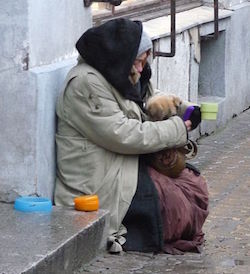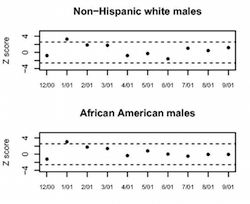
Can Stress Prolong Pregnancy?
show/hide words to know
Ethnicity: a group of people of the same race or nationality that share a specific cultural background.
Infertility: an inability to become pregnant or contribute to causing pregnancy after 12 months of trying by having unprotected sex.
Post-term: when something happens after it is expected, such as when a baby is born late (pre-term birth).
Pre-term: when something happens before it is expected, such as when a baby is born early (pre-term birth).
Stress: a feeling we have when reacting to a particular event. Examples of stressful situations include studying before a big test or when a basketball player has to take a shot that could win the game.
What's in the Story?

Stress is a relative thing. What makes one person stressed out may have no real effect on another person. Image by Caliva.
“Beep, beep!” You can hear the person behind you honk their car horn with frustration as traffic sits still for an hour. You’re late for work, you have meetings to attend, and you know your boss is going to yell at you for coming in so late. Your head begins to hurt, your palms start to sweat, and suddenly you’re feeling stressed.
Unfortunately, there are a lot of things in life that can cause people stress. The same is true for women who are pregnant. However, when a woman is pregnant stress may not only affect her, it can also affect the baby growing inside her.
In the Evolution, Medicine, and Public Health “Post-term birth as a response to environmental stress: The case of September 11, 2001,” scientists looked at the relationship between stress faced by pregnant women and its effects on the time they gave birth. They found that women who faced high stress situations often had pregnancies that lasted longer than the expected 9-month period.
Stress and Timing of Birth
Sometimes women who are pregnant can be placed in difficult situations that cause them a lot of stress and may put their health in jeopardy. Some scientists think that in early stages of pregnancy stress can cause a miscarriage, which is when a developing baby doesn’t survive. There are likely many different reasons why miscarriages occur, but how might stress be a possible cause in some cases?

Stress can be caused when environmental conditions are bad. Stress can often be more severe than being late for work or having a big test. For example, across the globe, over 1 billion people are thought to lack adequate housing, which would likely be very stressful.
Well, there could be direct effects of stress hormones on other processes in the body that could cause a miscarriage. But looking at it from a more evolutionary perspective, it could be possible that stress may at times be an indicator of bad conditions or a bad environment for future offspring. If conditions could be very bad for the baby, its chances of surviving may be low. High rates of miscarriage occur before most women even realize they are pregnant, and it’s possible that for early pregnancies, instead of investing resources into a baby that may not survive, the mother’s body might save the energy it would devote to that baby and use it to have a different child when conditions are better.
In this way, pregnancy is a bit of a balancing act. But whether or not a woman’s body continues a pregnancy is not the only factor affected by bad conditions. The length of the pregnancy may also change.
The expected time of gestation (length of pregnancy) in humans is about 40 weeks, or around 9 months. Pre-term, or early, birth can be bad for the baby, depending on how early it is born. Pre-term pregnancies can be caused by many things such as health problems, infertility issues, or high stress events.
But stress doesn’t only happen when a pregnancy is in its early stages. So what happens when a pregnancy is already far along, and conditions become bad for birth? Well, the mother’s body may actually be able to make the pregnancy last a little longer than usual, in the hopes that conditions will improve.
It’s Going to Take HOW Long?

Researchers suggest that during a sensitive period of gestation, stress may extend the length of a pregnancy.
Some scientists think that sometimes when pregnant women are surrounded by events that cause lots of stress, a pregnancy can be extended. Why would a longer pregnancy be a good thing? Well, under stressful situations the environment that surrounds the mother could be considered bad or harmful. Rather than giving birth to a baby in a bad or unpredictable environment, it may be better to try to wait a short amount of time in case the environment improves. If pregnancy is extended too long however, complications can arise and the mom and baby could both be in danger.
The Plane Crash on September 11, 2001
On September 11, 2001 a very tragic event took place in New York, where two planes crashed into the Twin Towers located in the World Trade Center. This was a huge historical event for the United States that took the American public by surprise and caused many deaths and injuries to thousands of people. The emotional impacts this event had on the American public were very strong. People felt fear, anxiety, and panic.
Researchers were interested in how this high stress event affected the gestation times of women who were pregnant (at any stage of pregnancy) on September 11, 2001. They retrieved information from the California Department of Public Health on gestational age, sex, the race or ethnicity of the mother, and the date of birth for 4,376,335 singleton (no twins, triplets, etc.) births. The data of the births were collected from 8 different groups of people from various ethnicities, including Caucasian, Hispanic, and African-American from October 1996 to November 2005. Then the odds of monthly post-term births were calculated from this data.
By knowing how likely it is for post-term births to occur in these populations over a longer time period, they could then see if the number of post-term births after September 11, 2001 was higher than expected. It was determined that women 33 – 36 weeks along at the time of the September 11th attack showed more post-term births than would be expected. These data show that having a high-stress event during a pregnancy could potentially increase the length of the pregnancy and extend the estimated delivery date.
When Later May Be Better
After studying the data of various moms and their birth dates, researchers found a connection between high stress events and women having longer-than-expected pregnancies. Pregnant women that were 33-36 weeks along on September 11, 2001 were found to have more post-term pregnancies than expected. Scientists think this could have occurred due to the high levels of stress pregnant women experienced, especially in the weeks following September 11th.
Stress can have major effects during pregnancy, and these effects can change depending on the stage of the pregnancy. Overall, it seems that avoiding stressful situations during pregnancy may be the best plan. However, if stress can’t be avoided, in some cases pregnancy may be extended in case the situation and conditions for birth will improve.
Visit Digging Deeper to learn how to critique research papers using this article as an example.
EvMed Edits are sponsored by ASU's Center for Evolution and Medicine.
Additional images via Wikimedia Commons. Newborn baby by WiLPrZ from Rabat, Maroc.
View Citation
Bibliographic details:
- Article: Can Stress Prolong Pregnancy?
- Author(s): Taylette Nunez
- Publisher: Arizona State University School of Life Sciences Ask A Biologist
- Site name: ASU - Ask A Biologist
- Date published: October 24, 2016
- Date accessed: January 13, 2025
- Link: https://askabiologist.asu.edu/evmed-edit/stress-timing-birth
APA Style
Taylette Nunez. (2016, October 24). Can Stress Prolong Pregnancy?. ASU - Ask A Biologist. Retrieved January 13, 2025 from https://askabiologist.asu.edu/evmed-edit/stress-timing-birth
Chicago Manual of Style
Taylette Nunez. "Can Stress Prolong Pregnancy?". ASU - Ask A Biologist. 24 October, 2016. https://askabiologist.asu.edu/evmed-edit/stress-timing-birth
Taylette Nunez. "Can Stress Prolong Pregnancy?". ASU - Ask A Biologist. 24 Oct 2016. ASU - Ask A Biologist, Web. 13 Jan 2025. https://askabiologist.asu.edu/evmed-edit/stress-timing-birth
MLA 2017 Style

Want to explore this paper further? Visit Digging Deeper for a critique exercise.
Be Part of
Ask A Biologist
By volunteering, or simply sending us feedback on the site. Scientists, teachers, writers, illustrators, and translators are all important to the program. If you are interested in helping with the website we have a Volunteers page to get the process started.







